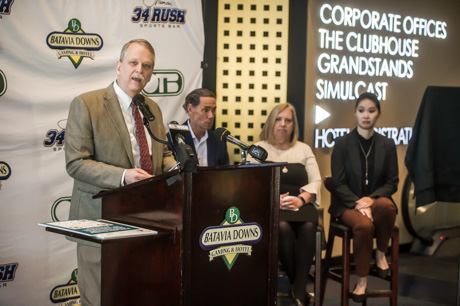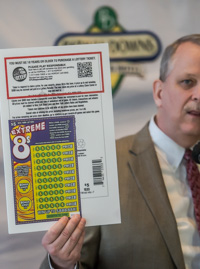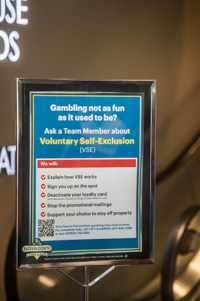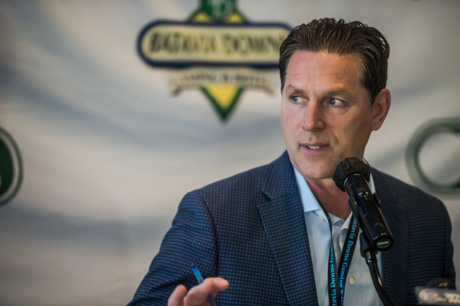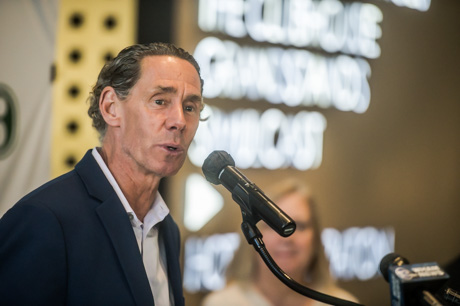If pulling on slots, handicapping ponies, scratching tickets, or waging on Sunday's big games has become more important to you than your family or job, you're addicted to gambling.
That's an important issue, according to state officials who visited Batavia Downs Thursday to promote problem gambling awareness and a new QR code system to help problem gamblers get help fast.
"Today's event is entitled, 'What is responsible gaming?'" said Gaming Commission Executive Director Robert Williams (speaking in top photo). "The answer to that question is dependent upon where you stand. For the player, it might mean not using gambling as a source of income, gambling only with money you can afford to lose, or setting time and money limits for gambling."
In an interview later, he contrasted betting with what you can't afford to lose with William Bennett, the former secretary of education in the Reagan Administration.
"It came out while he was doing his Book of Virtues tour around the United States, that his purpose of entertainment was to gamble and he was gambling several hundred dollars on a pull on slot machines, Williams said. "He could afford that. If you can't afford it, or the idea of gambling becomes something that affects your business or the way you conduct your life, and you think about gambling, it's preventing you from doing something at work, it's preventing you from doing something at home, then that becomes a problem."
The vast major of people who wager on slots, card games, sporting events, and lotteries are not problem gamblers, but because problem gambling can devastate people and families, and even communities, the state is trying to raise awareness about problem gambling, Williams said.
He was joined at Batavia Downs by three other state officials.
"Problem gambling is sometimes referred to as a silent addiction," said OASAS Commissioner Chinazo Cunningham. "It doesn't have the visible signs that others do. It can cause disruptions in the lives of people who are impacted and impact physical and mental health. Individuals diagnosed with gambling disorders have higher rates over a lifetime of substance use disorders, as well as mental health disorders. And there's a negative impact on family relationships."
There has long been a hotline problem gamblers or their family members could call for help, and a website, but those resources are not always the immediate help some people seek, Williams noted. The commission came up with the QR code to connect those seeking help more quickly with problem gambling resources.
"We currently have 31 OASAS-certified outpatient programs specializing in problem gambling," Cunningham said. "We also have 12 state-operated inpatient programs where people in need of inpatient care for gambling disorders can be treated. Treatment is also available through a network of private practitioners connected to each other."
The QR code will be displayed wherever legal gambling is available in the state and at public events such as county fairs. It will also be printed on scratch-off tickets.
"It's my understanding that the New York Lottery will be the first in the world to employ such a feature on scratch-off tickets," Williams said.
Batavia Downs takes the issue of problem gambling seriously said Henry Wojtaszek, president and CEO. Employees are trained to watch for the signs of problem gambling, such as excessive use of credit cards to fund bets and to listen to customers for statements that might indicate somebody is struggling with responsible play.
"We know our players by name and we interact with them in a way that says we would like you to have fun and find it entertaining here, but we have to pay attention to the major signs that happen," Wojtaszek. "To our staff's credit, they do that and they often bring up information to me when we try to interact with our guests and customers and try to help them in that regard. We're trained to see indicators from patrons that may have a problem. The staff takes their concerns to our managers on duty to see if we need to look further into the situation and explain the actual options we have for them."
Council Executive Director Jim Maney noted that the number of people -- media and Batavia Downs staff -- who turned out for Thursday's event was the largest they had seen at any gaming facility in the state for similar events.
"That is so important to raise the awareness of problem gambling in the state of New York," Maney said. "And why is it so important? Because we talk about wanting to advocate and care about our fellow people, they know when we care about them. And when you say -- you didn't say these exact words -- 'I'm a mom and pop organization,' what it really says is you guys do know your customers. You know each and every one of them by name. And when they know that you care about them, guess what? They care about themselves a little bit more, especially when we talk about addictions."
Photos by Howard Owens
Henry Wojtaszek
Jim Maney
Western PGRC Program Manager Angela DiRosa said, “Ensuring that all New Yorkers are aware of the potential risks related to gambling, as well as how and where to get help if gambling becomes a problem, is more important than ever. Leveraging technology like the QR Code is another way to remove barriers to problem gambling screening, intervention, and treatment, and reduces the stigma associated with seeking those services.”

